They have started marching. Will they stop? Doesn't seem so
Scores of students march from Regal Chowk to Karachi Press Club to the beat of resistance
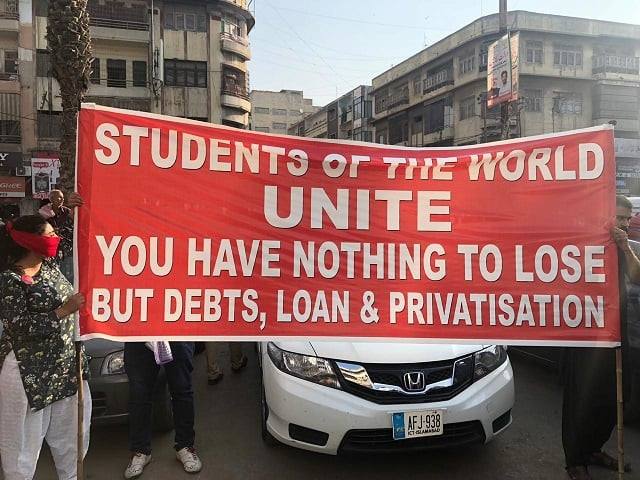
Scores of students march from Regal Chowk to Karachi Press Club to the beat of resistance. PHOTO: EXPRESS
There is something they want, something worth screaming themselves hoarse for, something they appear to yearn for. There are men and there are women, they are loud and they are clear.
‘Taleem pe hamla
na bhai na
Campus pe hamla
na bhai na'
Curious onlookers stand a little away from the circle. They have abandoned their shops and come to see what all the hue and cry is about. Parked along the sidewalk are a couple of motorcycles of the traffic police, a little behind them is a police mobile.
The police officials seem cooperative enough, they simply usher those coming to join the students in black and red, off the road and onto the side walk.
They are here to ensure traffic flow is not disrupted. At a paan kiosk nearby are some Rangers on patrol and behind them, an Edhi ambulance.
‘Mere desh ke tulba
Zinda hain
Mere desh ke tulba
zinda hain'
The clock strikes 3, the crowd begins to grow. More and more youngsters join those in the centre. The girl playing the bongo hits it harder, the chants grow louder, the tall kid with a long beard doesn't seem to notice his spectacles almost falling off his nose as he throws his fist up in the air and yells ‘hum kya chahtay hain'. Scores of students shout back ‘azadi!'
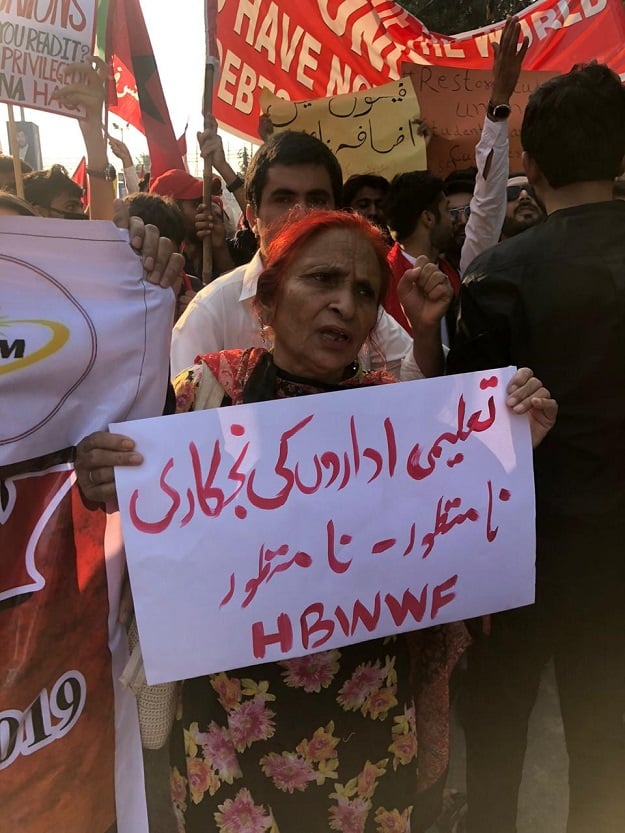 PHOTO: EXPRESS
PHOTO: EXPRESSThe students are aplenty and 20 minutes later they are ready to march. They have been rallying on social media, on the streets, on campuses, through Whatsapp, through pamphlets, for nearly a month and today (Friday) is the day.
Today they march for their demands - the provision of merit-based, quality education in all institutions, an end to racial, religious, and gender-based profiling of students, withdrawal of the recent fee hikes and restoration of the HEC's budget, constitution of legal committees for sexual harassment cases with students' representation, uniform curfew timings irrespective of gender, and the lifting of the ban on student unions as per Sindh Assembly's resolution and for the rest of the country to follow suit.
‘Tujhe kiska dar hai, khol ke bol
Halla bol, halla bol'
The organisers and their volunteers begin motioning for the marchers to line up. They have screamed themselves hoarse, clapped till their hands hurt, and are now ready to walk towards the Karachi Press Club where they will assemble and reiterate their demands.
More students join in as the procession heads towards Zaibunissa Street. Several of them are fresh graduates; even more of them have just completed their secondary education and are set to begin their university careers.
 PHOTO: EXPRESS
PHOTO: EXPRESSHasan, a 19-year-old set to join a varsity in the next semester, says he is marching because the current way that private educational institutions profit off of students is ridiculous.
Another 19-year-old, who requested anonymity, for fear of ‘disciplinary action' by the administration of Habib University, where she is a first-year student, says, “I am marching because I want student unions. A single student is vulnerable. A union won't be.”
She gives the example of sexual harassment on campus. A single student alleging harassment can be silenced, she says from behind a surgical mask, which she wears to protect her identity. A union, however, would force the administration to pay heed to the students' concerns, she adds.
How would a union do that? “A union can rally together and collectively refuse to pay the fees. That's how they got private school fees reduced. By collectively refusing to pay,” she says.
When asked how single students are vulnerable, she says that without the support of a collective voice, students can be, “suspended, expelled, anything”.
The students march forth. A group of the youngsters in black and red are on a Suzuki van ahead, leading the march. Carrying on with their chants, they keep the marchers going.
Student Solidarity March: Protesters call for restoration of student unions
On foot, every few feet, there are others yelling passionate slogans, and the marchers near them, shout back.
‘Haathon main lekay haath challo! Challo challo saath challo'.
A young man with long hair holds the tambourine in his hands, as he shouts ‘jaagidar ke khilaf halla bol!' ‘Halla bol, halla bol!' scream those in his immediate vicinity.
There can be no policy level changes without student unions, says Zafar, a final year International Relations major at Karachi University.
He laments that students don't have access to basic facilities on campuses. In his varsity, he says, there is a lack of bathrooms and water coolers in several departments. “Some departments don't have any.”
Besides, he says, the varsity has over 35,000 students and there are barely 30 or 40 points [buses] available.
There are no hostels either, he adds. Zafar, who is from Balochistan, rents a flat with two other students for Rs15,000 each month. “I get Rs10,000 from home. Rs5,000 goes on rent,” he says, adding that the lack of water coolers means that students are forced to buy bottled water and not everyone can afford that.
I don't know if the march will amount to something, but it is certainly a step in the right direction, said a fourth-year student of the Institute of Business Administration, who also requested anonymity.
‘Zulmi jab bhi zulm karay ga,
Chappa chappa jhoom uthay ga
Inqilab ke naaron se'
When asked why he is at the march, Karamat Ali, a founding member of the Pakistan Institute of Labour, Education and Research, says that it was in October,1968, that he had stood at the same spot on Regal Chowk and marched for his rights.
Did those marches amount to anything? "Ayub ki chutti hogayi thi" [We got rid of General Ayub Khan]," he says, adding that it was after a long time that the youth was raising a collective voice in this country.
 PHOTO: EXPRESS
PHOTO: EXPRESSThe period of General Zia's rule was one of immense repression, he says, not just physical repression but also ideological repression. If these youngsters remain consistent and persistent in their demands, the march will certainly amount to something, he says, while jokingly adding, "app tou kisi ki chutti nahi maang rahe" [you aren't asking for anyone's resignation].
Meanwhile, Fizza of the Aurat Haq, said that her organisation stood with all those groups who are marginalised at a structural level as they are not given representation in decision making. Students are one such group, she added.
The issues facing the students are aplenty. The students of private varsities appear even more afraid to vocalise their demands as the lack of a collective renders them vulnerable to punitive action by their respective varsities.
To speak against the institutes too appears impermissible. The students of public universities, however, are less concerned with hiding their names or faces from the administration.
As one KU graduate put it, “There are so many of us, how many will they come after?” The fear there, appears to be of retaliation from what they call right-wing groups that prevent other student bodies from organising.
Added to the policing on campuses, whether formal or informal, is the non-provision of basic facilities to students seeking their basic right of higher education. And now the students want unions so they can ensure their concerns are heard.
The Students Solidarity March certainly built momentum in Karachi. The students did come out on the streets. How far they reach now remains to be seen.
‘Hum kya chahtay hain
Azadi!
Hum le ke raheinge
Azadi!'


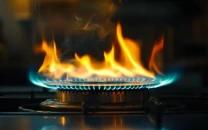
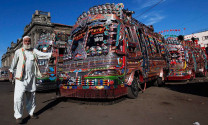
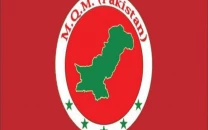
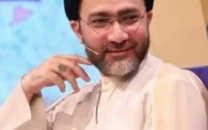


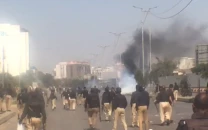

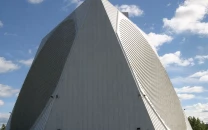
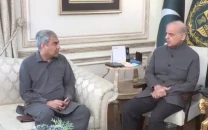
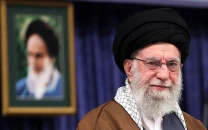






COMMENTS
Comments are moderated and generally will be posted if they are on-topic and not abusive.
For more information, please see our Comments FAQ